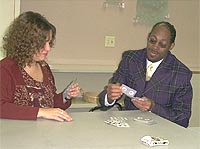
 |
HIV related cognitive/motor disorders can lead to missed appointments, breakdown in medication regimens, an overall disruption in self-care abilities, and reduced quality of life. Features include impaired attention and concentration, slowed information processing, compromised problem solving abilities, apathy and social withdrawal, and neuromotor dysfunction (Heaton et al., 1995; Lopez et el., 1998; McArthur, Sactor, & Selnes, 1999). |
•David has difficulty keeping track of a conversation; he loses his concentration and
demonstrates an inability to recall what was said.
•Rosalita gets confused on how to get to the drug store on her corner.
Once she gets there, she drops off her prescription and forgets to pick it up.
•Terrel gets up from watching TV and goes into the kitchen to get
something to eat. Once in the kitchen, he wonders what he is doing in there.
•Monique cannot seem to shake her lethargy despite receiving mental
health treatments. She fatigues easily and has weakness in her muscles.
.
•John went to the doctor 4 months ago. He spoke clearly and said
he was taking his medication regularly. This month, John missed 2 appointments
and then arrived an hour late at the doctor's office. He was anxious, his speech was unclear
and he had difficulty communicating his thoughts.
Mild cognitive changes often wax and wane. It is not uncommon for a client to display memory loss during one appointment and then normal cognitive functioning on the next appointment. Changes in cognition may result from: nerve loss, opportunistic infection, medications, depression, mental illness, anxiety, or substance use, etc.
Strict compliance with HAART regimens has been found to be the most effective means to delay and in some cases reverse the progression of HIV-associated neurocognitive disorders. When failing memory effects HAART compliance, behavioral compensatory strategies can help the patient to monitor and remember medication schedules. Expanding the treatment team to include a neuropsychology clinician may improve the patients ability recoup lost cognitive function through the implementation of a restorative memory treatment plan.
Restorative memory strategies involve both internal and external compensatory aids. Internal aids include: repetition, rehearsal, vanishing cues, mnemonics, etc. External aids include: human helpers, signage, color lines, lists, notebooks, voice organizers, electronic medication dispensers, etc.
Table1: Cognition Change describes common symptoms of cognitive impairment and interventions that you may find helpful.
|
Symptom |
Example |
Interventions
|
| Decreased attention & concentration | Losing track of a conversation |
Maintain eye contact when talking to the person, frequently using his/her name in conversation. Provide information to individuals and their families about dementia. Teach client strategies on how to communicate with doctors/clinicians. |
| Forgetfulness | Misplacing familiar, commonly used objects. Forgets to take medication. | Help the person to designate consistent spots for keys, wallet, purse. Develop a realistic and practical system for adherence by developing a buddy system - Have a friend call at the same time every day for medication reminders. Link medication with a meaningful activity - Take medication each day during favorite soap opera/TV show. |
| Disorientation | Forgetting the day of the week or time of day. Getting lost. | Safety and supervision are primary. Display easily visible/accessible clocks/calendars. Keep a notebook of directions. Try color coding "How-To" instructions for appliances . |
Compensating for Memory Loss There are some simple things that
can be done to help alleviate the frustration experienced by a person
who is having trouble remembering:
•Simplify the living space; reduce clutter, create functional activity stations.
•Help the person establish
routines.
•Develop a list of important things to check before leaving the house.
•Encourage the person to talk aloud to focus attention.
•Encourage participation in activities that stimulate the mind.
•Post important contact info near the telephone.
•Establish a telephone log to track calls and important
information.
•Post simple "how to" instructions for activities that
require several steps.
•Label drawers and doors as needed.
•Obtain a clock that clearly displays time, day and date.
•Locate a calendar/log to record HAART treatment compliance near the medications.
•Create a personal activities log or planner. Some points to remember
when making a planner for someone else: make sure the print is easy to read; ask
the person what s/he would like to have included in the planner; keep it simple;
locate the planner as close to the activity as possible.

RnCeus
Homepage | Course
catalog | Discount
prices | Login | Nursing
jobs | Help
©RnCeus.com 2008